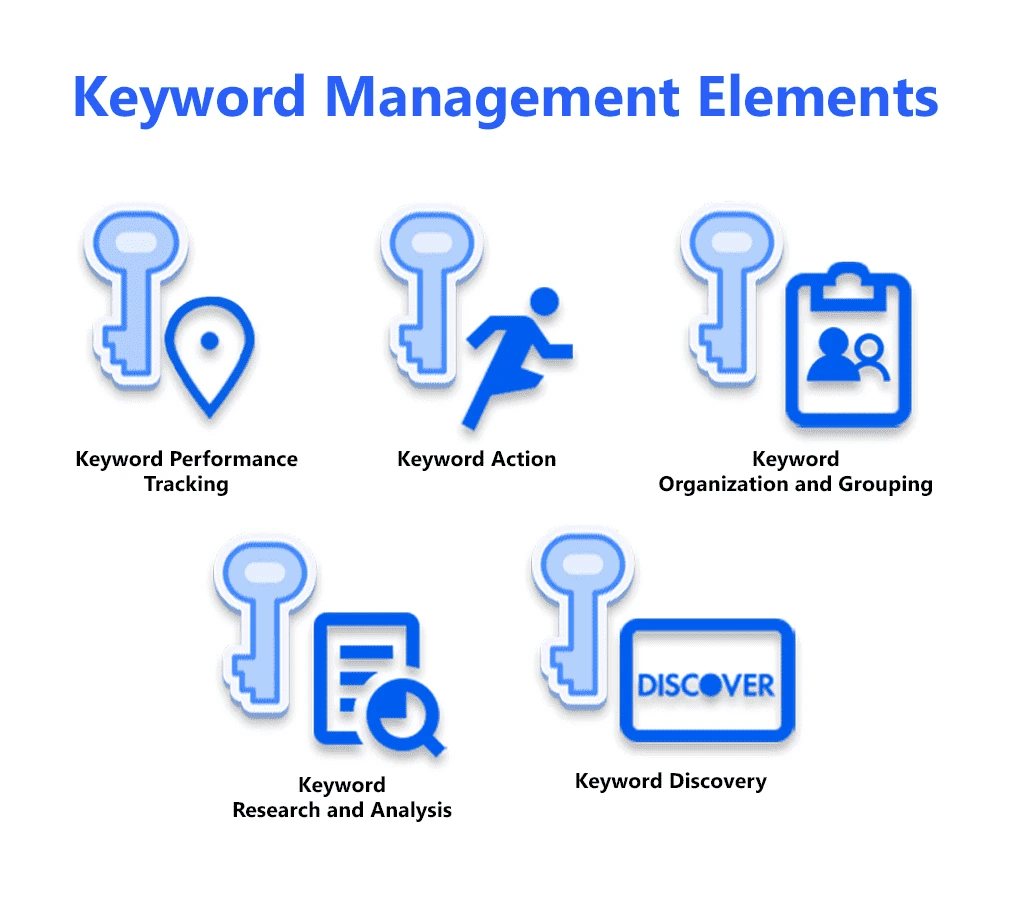WriterZen - How to Manage Keywords and Track Their Performance Strategically
Keyword Management: An Overview
Website audits reveal a lot about your website’s performance. The keywords used for an SEO campaign need to be constantly tracked and managed to understand what is working and not working for your website.
While building backlinks and posting content regularly, marketers forget to analyze how their previous content is performing and what changes to make next for better performance of keywords. Proper keyword management will help you get the most out of your SEO campaigns.
Besides, the key to keyword management is identifying and tracking high-value keywords. You can use keyword performance analysis tools to determine which search queries led your visitors to your site.
Effective keyword research is discovering what your target audience searches for and organizing those keywords. By managing your keywords into keyword groups, you'll be able to optimize your search engine optimization strategy.
Understanding the keyword landscape is an essential step in managing and tracking keywords. The keywords that bring high traffic and conversions provide useful data to implement in your SEO campaigns.
The Importance of Keyword Management in SEO
Keyword management is a game-changer in terms of making quick decisions. It saves your time and effort to yield better results and higher website traffic every time.
As an important stepping stone of SEO, finding the right keywords for your website enables the implementation of better SEO campaigning. It brings data-driven solutions to your doubts related to online marketing.
Employing various methods like keyword organizing, keyword discovery, keyword analysis, and keyword action enable a smooth, productive, and resource-saving process of keyword management.
Let us sum up some of the most important advantages of keyword management for SEO:
It brings more relevant content inspiration for marketers focusing on SEO.
It helps you analyze and get more traffic to your webpage.
It leads to better targeting.
It enables a higher click-through rate, leading to a good quality score and, eventually, higher organic rankings on the search engine results page.
The process of conversion is optimized and strategically planned.
The Elements of Keyword Management
There are several aspects of keyword management that need to be understood before diving into organically marketing your business online. They are as follows:

Keyword Discovery: The method of keyword discovery is a constant process of looking for PPC keywords that get searched to find your website. It helps you understand what keywords are used to find your website.
It gives you insight into what your target audience is typing in the search queries to lead to your website. Get a clear understanding of what popular search queries are related to what your website or business offers.
Keyword Research and Analysis: Keyword research or analysis bring a vast scope for keyword opportunities that help you recognize productive keywords; that is, the keywords that help bring some action like conversion of a target audience to your customers.
Keyword Organization and Grouping: Divide and organize the keywords into small groups based on their relevance. You can group and rank the keywords based on the value of each keyword cluster to see which one drives your campaign. It helps you understand the number of keywords you need for an SEO campaign.
Keyword Action: The actions you take will depend on the previous steps. You can group or update keyword lists based on observations and results of the previous steps for a better keyword management system.
Keyword Performance Tracking: Keyword performance tracking involves a process of using tools to monitor and analyze the performance of a set of keywords regularly.
It ensures that you learn where you stand among the hierarchy of competitors and if you are earning profits. Keyword rankings are a great way to judge performance and conversions taking place.
Essential Features and Process of a Good Keyword Management Strategy
Keyword Discovery: Identifying High-Value Keywords
Identifying high-value keywords is an essential part of SEO strategy. Not all high-value keywords are generic terms that cost a fortune.
Instead, look for highly targeted keywords with a high search volume and show that the person searching for them is interested in what you have to offer.
Niche keywords are often low-volume, but they can bring you plenty of targeted traffic that is more likely to convert to a sale. Small businesses should also consider looking for niche keywords with lower search volumes.
Thus, keyword discovery allows you to access and study the keywords that your website is already ranking.
Researching and Analyzing Keywords
If you're starting in the world of SEO, researching keywords and their importance is essential to the success of your business.
Before, you might get the temptation to stuff your content with keywords to increase its ranking, but Google penalizes this practice. While keyword density is still critical, the quality of content is king.
By using specific key phrases, you'll be able to draw in customers who are looking for a particular product or service.
Organizing Keywords
For a strong SEO strategy, organizing keywords is vital. It would help categorize them by category, target persona, and campaign. Tags provide additional organization and can be used to group keywords within a variety.
This way, they know which keywords to focus on in a given content. In addition, you can use notes to include additional information, such as who is responsible for the campaign and what channels to target.
Segmenting and Distributing Your Keywords Strategically
Before executing your campaign, know which keywords you should target. Targeting a younger audience or a more competitive landscape will require different strategies.
To do this, you must understand the competitiveness of different keywords. You can further refine your campaign by defining ad groups. Here are some tips:
Targeting an Audience Based on Your Goals
The first step in content creation is to determine the demographic of your target audience.
It may include millennials, Gen Z, and other broader categories. However, these groups can be too general to be effective.
For example, if you want to market to women who are mothers, it may be best to target young women. They are more likely to be engaged with this content than the average person.
The internet provides many marketing opportunities. The use of persuasive and viral marketing strategies is increasingly common in marketing. Almost everyone now has a personal computer or a smartphone.
The youth demographic is increasingly dependent on technology and is increasingly involved in social media. Using persuasive techniques to reach this audience can be particularly effective.
In addition to using persuasive techniques, marketing campaigns can spread through the internet and word of mouth.
Targeting A More Competitive Landscape
Conducting a competitive analysis of your target industry will give you insights into the competitors' strengths and weaknesses. Start by gathering data about competitors' locations, website URLs, and other information.
Next, you will analyze their strategies to determine the potential resources that your company can use to dominate the market. Market-based view (MBV) strategic framework helps explore the competitive landscape.
Porter's five forces model enables you to identify the factors that determine the competitive landscape.
Understanding The Competitiveness Of Different Keywords
There are many different ways to learn about the competitiveness of a particular keyword. Keyword analysis tools help you do this.
To use a keyword analysis tool, you need to enter a competitor's domain or a specific page to see how competitive that keyword is. You can also check the search volume and the cost per click for that keyword.
Keywords get ranked based on the competition level by checking out highly-ranking pages. SEO experts get trained to examine the websites with high rankings and determine whether they are using strategies that can help your website rank higher.
Learning from the competition's methods can improve their keyword research and rank higher. In the long run, this will increase ROI.
Regardless of your business size, keyword competitiveness analysis will help you identify the keywords that will best suit your website's needs.
Creating Clear Goals for Keyword Performance
A vague goal is impossible to measure and will not make you any progress. You must be specific and ask yourself the questions necessary to complete your plan in more detail.
You can use analytical tools to measure progress in your keyword research. Without a goal, your keyword strategy will stagnate and be unproductive.
To create a concrete plan, consider your target audience and determine the keywords to attract them.
Keyword Action
After you finalize your next step based on the previous steps, you frame a list of authorization activities that suit your SEO campaign. It helps you to create more high-performance website content that features on the SERP.
Based on the keyword data, you can frame keyword groupings like top-level keywords, specific subgroup keywords, etc.
Several aspects like spellings, derivation, synonyms, and duplicate keywords, affect your next step in choosing the right keywords.
Keyword Performance Tracking: A Brief Overview and Understanding
Keyword performance tracking is the process of keeping records about the number of people who find your website all by themselves.
It reveals any significant changes that occur in trends so that you can alter your site’s elements to fit what is in demand.
Tracking keyword performance helps you to maximize your profits and cater to the audience with high-quality content.
It also helps enhance your overall website performance and educates you to make better decisions while framing SEO campaigns.
You can identify the areas that need improvement by monitoring and position tracking your website based on the target keywords.
It helps you identify the reasons for a drop in performance and unveils the high-performance keywords that are working for your website.
In reality, the dynamics of keyword performance keep changing with the varying demands of the audience. You may use tracker tools to analyze the performance of your target keywords.
Keep checking the structure and tone of your website and compare it with your competitors to take action accordingly. Keyword monitoring is a continuous process.
Build new SEO campaigns to gain a more evolved list of keywords that are potent and help your website flourish.

Keywords are essential for SEO, and monitoring them will help you understand your opportunities
https://writerzen.net/blog/how-to-track-keyword-performance
#WriterZen, #trackkeywordperformance#trackkeywordperformanceWriterZen

Nhận xét
Đăng nhận xét